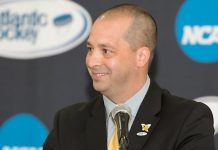Utica has been cited by the NCAA for failing to monitor its financial aid program for Canadian students and will be on probation for two years.
The punishment, announced Thursday by the NCAA, also includes public reprimand and censure, a postseason ban for any teams that include a player still receiving that kind of financial aid and a request for increased scrutiny of the school’s aid-award process.
Utica no longer offers CISA awards, a athletic department spokesperson said, and therefore won’t be subjected to the postseason ban.
The NCAA Division III Committee on Infractions found that Utica’s Office of International Education did not actively track whether awardees for the Canadian International Student Aid program were student-athletes.
That, the committee ruled, amounted to a failure to monitor the program.
The school noted, however, that the lack of tracking was intentional because it didn’t want athletics participation to be a consideration in the decision whether to award aid.
“We still had to have a hand in watching as an institution, and we didn’t do that,” Utica athletic director David Fontaine said in a phone interview with USCHO on Thursday.
Asked about the good intentions of the program being met with bad results, Fontaine said: “You’ve got to have the balance. We’ve got to make sure we have safeguards in place to make sure this won’t happen in the future. … We’re confident it won’t happen going forward.”
The school introduced the CISA program in 2010 to, according to an NCAA release, attract Canadian students to under-enrolled majors. The aid provided would make the cost of attendance for a Canadian student roughly equivalent to that of a domestic student.
Utica cleared the program with the NCAA, which advised to use the same standard for all Canadian students, be they student-athletes or not, and to “carefully monitor the impact of the financial aid.”
In the 2010-11 season, the school awarded aid under the program to five students, all men’s hockey players. In 2011-12, 11 students received the aid; eight were student-athletes — six from men’s hockey and one each from women’s hockey and baseball.
Utica’s men’s hockey team made the NCAA tournament for the first time in 2013 — its 12th season — and advanced to the national semifinals.
Utica issued a statement on the punishment:
During the 2009-2010 academic year, Utica College undertook an initiative to increase its enrollment of Canadian students, as part of a larger effort to further expand the College’s growing geographic footprint. The College was strongly positioned in regards to its academic and extracurricular programs to meet particular needs and interests of Canadian students, and allocated additional financial aid specifically targeting Canadian students in select degree programs. The College recognized at that time that this initiative, if not implemented and administered properly, placed the institution at possible risk of falling out of compliance with NCAA regulations concerning financial aid for student-athletes. For this reason, the College sought advice from NCAA compliance officials and other sources when structuring this initiative so to address this risk and provide safeguards we believed then were sufficient. Regretfully, these safeguards were not sufficient.
From 2009 to 2011, the College awarded a small number of institutional grants to Canadian students, a disproportionate number of which were awarded to students participating in intercollegiate athletics. While this activity was non-deliberate, we nevertheless take full responsibility, and do not take our shortcoming lightly.
The College proactively ceased this initiative in 2011, including grants previously awarded. For the past two years we have been working closely with the NCAA to re-examine our financial aid award activity during the period in which the initiative was in effect. Utica College remains committed to expanding access to Canadian students, a population the College remains uniquely positioned to serve. However, we will consider resuming this initiative only at such time that we are confident that our processes have been unequivocally corrected. The sanctions imposed today by the NCAA and the measures the College has previously adopted to ensure a more efficient monitoring system are components of that corrective process.
As an institution that has taken extraordinary pride in fostering and promoting the values of Division III athletics, we remain unswerving in our dedication to the highest principles of fair play. As such, we do not challenge these corrective sanctions; rather, we view them as an opportunity for improvement.
A number of Division III hockey schools have been sanctioned in recent years by the NCAA for aid infractions, some also involving international students.
Morrisville, Neumann and University of New England were punished in 2012, while Potsdam State was hit in 2011 and Geneseo and Buffalo State received sanctions in 2010.


